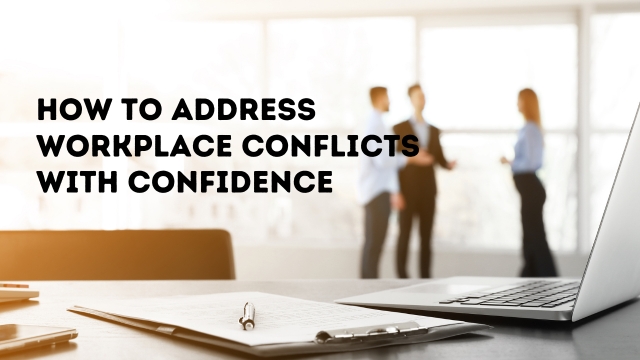Workplace conflicts are a common part of any professional environment. Conflicts can arise in any team, whether disagreements over project directions, personality clashes, or misunderstandings. While they can be uncomfortable, addressing these conflicts confidently can lead to improved relationships and a more productive workplace. Here’s how to tackle workplace conflicts effectively and with self-assurance.
1. Stay Calm and Collected
The first step in addressing conflict is to remain calm. Emotions can run high during disagreements, and reacting impulsively can escalate the situation. Take a moment to breathe deeply and collect your thoughts. Take a short break to clear your mind before addressing the issue. This pause can help you approach the conversation with a level head, allowing you to articulate your thoughts clearly and effectively.
2. Prepare for the Conversation
Preparation is crucial when dealing with conflict. Take some time to reflect on the situation and identify the key points you want to address. Here are some questions to consider:
- What specifically triggered the conflict?
- How did it make you feel?
- What outcome are you hoping for?
3. Choose the Right Time and Place
Timing and setting matter when it comes to addressing conflicts. Avoid bringing up sensitive topics in front of others, as this can make the other person feel defensive. Instead, find a private setting where both parties can speak freely. Also, choose a time to focus on the conversation without distractions. A calm environment encourages open communication and demonstrates respect for each other’s feelings.
4. Listen Actively
Effective communication is a two-way street. After sharing your feelings, allow others to express their thoughts and feelings. Practice active listening by:
- Maintaining eye contact
- Nodding to show understanding
- Avoiding interruptions
5. Focus on Solutions
While expressing your feelings and concerns is essential, the ultimate goal should be finding a resolution. Collaborate with the other person to identify potential solutions. Ask open-ended questions like, “What do you think we can do to move forward?” This encourages teamwork and reinforces that you’re both working toward the same goal. A willingness to find a middle ground can strengthen relationships and improve collaboration in the long run.
6. Keep Emotions in Check
Feeling emotional during a conflict is natural, but allowing those emotions to take control can hinder productive communication. If you feel frustrated or angry, take a deep breath and pause before responding. This can help you maintain a calm demeanour and prevent the discussion from escalating into an argument.
7. Know When to Involve a Mediator
In some cases, conflicts may become too challenging to resolve independently. If discussions aren’t leading to a resolution, consider involving a neutral third party, such as a manager or HR representative. A mediator can provide an unbiased perspective and facilitate the conversation, helping both parties feel heard and understood.
8. Build Stronger Relationships
Addressing conflict isn’t just about resolving disagreements; it’s also an opportunity to build stronger relationships. By handling conflicts with confidence and care, you demonstrate your commitment to open communication and collaboration. To strengthen bonds, engage in team-building activities, casual conversations, or coffee breaks. The more comfortable you are with each other, the easier it will be to navigate conflicts in the future.
Remember that conflicts are a natural part of any workplace and can lead to growth and collaboration when handled well. With practice and patience, you can turn conflicts into opportunities for connection and understanding, paving the way for a more harmonious workplace. Embrace the challenge, and you’ll find that addressing conflicts can ultimately strengthen your confidence and your professional relationships.





